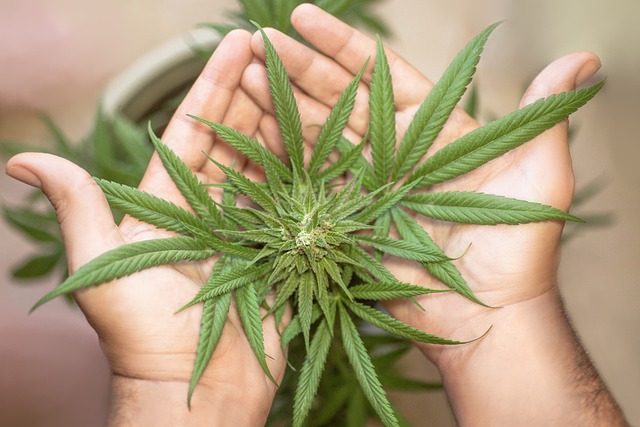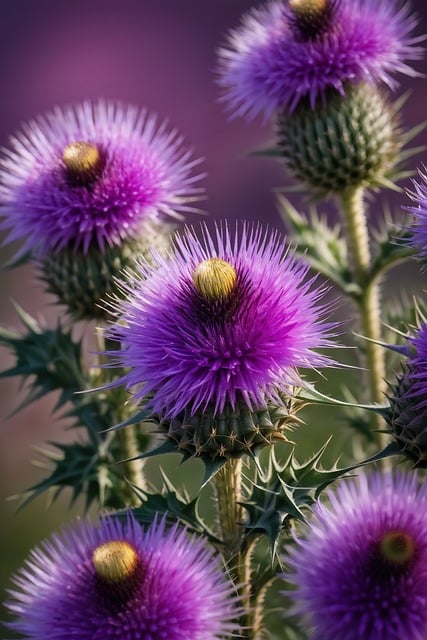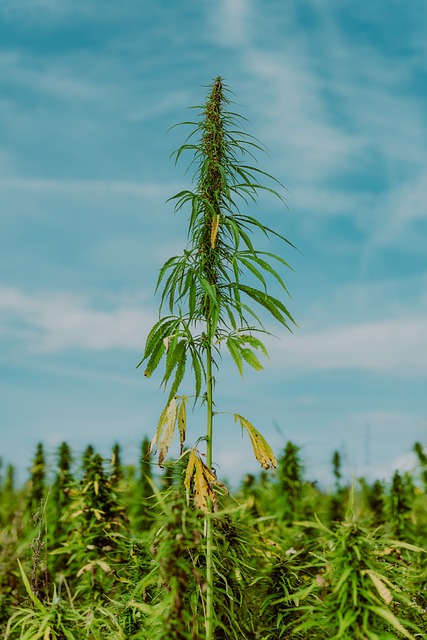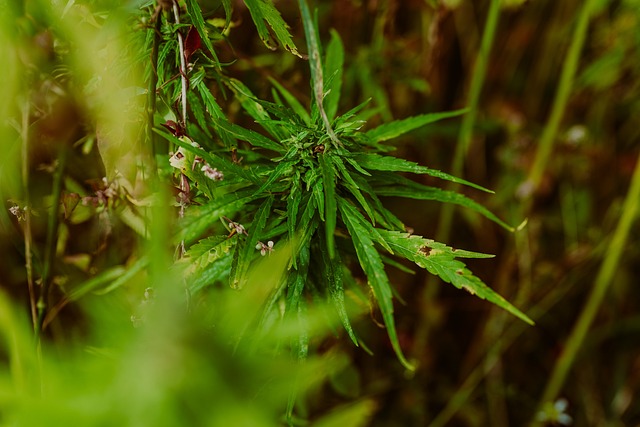Δ9-tetrahydrocannabinolic acid (THCA), a non-psychoactive cannabinoid present in raw cannabis, has a specific legal status in Indiana. While the 2018 Farm Bill federally decriminalized hemp and its derivatives like THCA, provided they contain less than 0.3% THC by dry weight, this doesn't fully clarify THCA's legality at the state level, where it exists in a legal gray area. Indiana's Senate Enrolled Act 521 has legalized low-THC cannabis oil for medical conditions, which has indirectly paved the way for THCA to be used in products that comply with these regulations. However, raw cannabis flowers high in THCA remain in a regulatory limbo. Consumers and manufacturers in Indiana must navigate this complex interplay of state and federal laws when dealing with THCA-containing products. THCA's legal consumption in Indiana is permissible under strict conditions set forth by the Farm Bill and state regulations, emphasizing the need for compliance and informed decision-making. Research indicates that THCA may offer health benefits, including anti-inflammatory and neuroprotective effects, without the psychoactive effects of THC. As such, individuals interested in exploring THCA's potential are encouraged to do so within the confines of the law and with an understanding of its evolving legal landscape and scientific research. Staying informed about changes in state laws is key for consumers looking to legally use THCA in Indiana.
Explore the intricacies of THCA flower, a non-psychoactive precursor to THC that’s gaining attention for its potential wellness benefits. Delve into its legal standing in Indiana and understand the nuances surrounding its use. This article provides a comprehensive overview of THCA’s emergence as a significant player in the cannabis domain, its legal status, and the scientific insights into its effects. Learn how to responsibly engage with THCA flower within the framework of Indiana laws for a safe and informed experience.
- Understanding THCA Flower and Its Legal Status in Indiana
- The Emergence of THCA as a Precursor to THC: A Closer Look
- Benefits and Effects of THCA Flower: What Research Suggests
- How to Safely Consume THCA Flower in Compliance with Indiana Law
Understanding THCA Flower and Its Legal Status in Indiana

Throughout recent years, there has been increasing interest in the cannabinoid THCA, or tetrahydrocannabinolic acid, a non-psychoactive precursor to THC found in raw cannabis flowers. Understanding THCA legal status in Indiana is crucial for consumers and manufacturers alike, as it navigates the complex web of state and federal laws governing cannabis products. In Indiana, the legal landscape regarding THCA flower is defined by the state’s broader cannabis legislation. As per Indiana law, cannabis remains a controlled substance under the federal Controlled Substances Act; however, the Indiana General Assembly passed Senate Enrolled Act 521 in 2017, which allows for the use of low-THC cannabis oil to treat certain medical conditions, provided it is obtained from a state-licensed dispensary. This legislative action paved the way for legal clarity on the use of THCA in derived products that contain less than 0.3% THC by dry weight. It’s important to note that possessing raw cannabis flowers with high THCA content is not explicitly criminalized under this act, but it exists in a legal gray area at the state level, as long as it is not processed into products with higher THC levels. At the federal level, the 2018 Farm Bill legalized hemp and its derivatives, including THCA, which has led to a more nuanced approach to the regulation of cannabis-related compounds. However, the DEA still classifies THCA as a Schedule I controlled substance, complicating the narrative around its legality. As such, while there are pockets of legalization for certain THCA-containing products in Indiana, it is essential for individuals to stay informed about the evolving laws and regulations surrounding THCA flower and its derivatives.
The Emergence of THCA as a Precursor to THC: A Closer Look

delta-9-tetrahydrocannabinolic acid (THCA) has garnered significant attention within the cannabis community, particularly as research continues to unveil its unique properties and potential benefits. Unlike its well-known isomer, delta-9-tetrahydrocannabinol (THC), THCA is the non-psychoactive precursor to THC. It’s found abundantly in raw cannabis flowers and becomes psychoactive only when heated above a certain temperature, typically during the combustion or decarboxylation process. The interest in THCA, including its legality in states like Indiana where it falls under the broader definition of hemp-derived products, stems from its potential therapeutic applications. For instance, preliminary studies suggest that THCA may offer anti-inflammatory and neuroprotective properties, which could be beneficial for various conditions. As such, consumers and researchers alike are exploring the full spectrum of benefits that THCA can provide, often through the use of cannabis flowers high in this cannabinoid, while also adhering to the evolving legal landscape surrounding cannabis-related compounds. With the increasing body of research and the changing legal status of these substances, THCA is positioning itself as an important figure in the world of cannabinoids, offering a new perspective on what can be derived from the cannabis plant.
Benefits and Effects of THCA Flower: What Research Suggests

Delta-9-tetrahydrocannabinol (THC) is well-known for its psychoactive effects, but before it undergoes decarboxylation through heat, there is another cannabinoid called tetrahydrocannabinolic acid A (THCA). THCA, which is the raw form of THC found in raw cannabis plants or flowers, has been the subject of growing interest due to its potential health benefits. According to recent studies, THCA may offer a range of therapeutic effects without the psychoactive ‘high’ associated with its decarboxylated counterpart. Research indicates that THCA could have anti-inflammatory and neuroprotective properties, making it a subject of interest for conditions like multiple sclerosis and neuropathic pain. Additionally, preliminary findings suggest that THCA may possess antiemetic qualities, which could be beneficial for individuals undergoing chemotherapy.
In the context of legal considerations, it’s worth highlighting that the status of THCA flower varies by state within the United States. In Indiana, for instance, hemp-derived products containing less than 0.3% THC are legal, provided they are sold and labeled appropriately. This legal distinction allows consumers in Indiana to legally access THCA flower, often marketed as ‘hemp flower,’ which can be used for its potential wellness benefits. As with any supplement or medication, it is advisable for users to consult with a healthcare professional before incorporating THCA flower into their health regimen, given the evolving body of research on this compound and its effects. The benefits and effects of THCA flower, as suggested by ongoing studies, are promising, but more comprehensive research is needed to fully understand its potential role in various wellness practices.
How to Safely Consume THCA Flower in Compliance with Indiana Law

navigating the consumption of THCA flower must be approached with both caution and adherence to local regulations. As of the knowledge cutoff in early 2023, THCA, or tetrahydrocannabinolic acid, a non-psychoactive precursor to THC found in hemp and cannabis plants, is legal in Indiana under certain conditions. Consumers interested in safely engaging with THCA flower must first ensure that their source of the product has less than 0.3% THC on a dry weight basis, adhering to the Farm Bill guidelines that classify hemp as an agricultural commodity.
To comply with Indiana’s laws, it is imperative to purchase THCA flower from reputable sources and verify the product’s certification and compliance with state regulations. Once in possession of legal THCA flower, safe consumption can be ensured by following recommended guidelines for dosing, which often include starting with a low dose to assess individual sensitivity, and avoiding combustion methods like smoking. Alternative consumption methods such as vaporization or infusion into edibles can mitigate the risks associated with smoke inhalation. Additionally, storing THCA flower in a cool, dry place away from children and pets is crucial for safety and legality. Always stay informed about any updates to state laws regarding hemp-derived products to maintain compliance and ensure responsible consumption of THCA flower in Indiana.
navigating the nuanced landscape of cannabinoids has led to a growing interest in THCA flower, a non-psychoactive precursor to THC. As explored within this article, understanding THCA’s legal status, particularly in Indiana, is paramount for consumers and enthusiasts alike. The emergent research underscores the potential benefits and effects of THCA flower, offering insights into its therapeutic properties without the psychoactive impact of its counterpart, THC. With careful consideration of Indiana’s regulations, one can safely engage with THCA products, ensuring compliance while experiencing the unique benefits they offer. As the conversation around cannabinoids continues to evolve, staying informed on the legalities and scientific findings surrounding THCA flower remains essential for those within the state and beyond.
